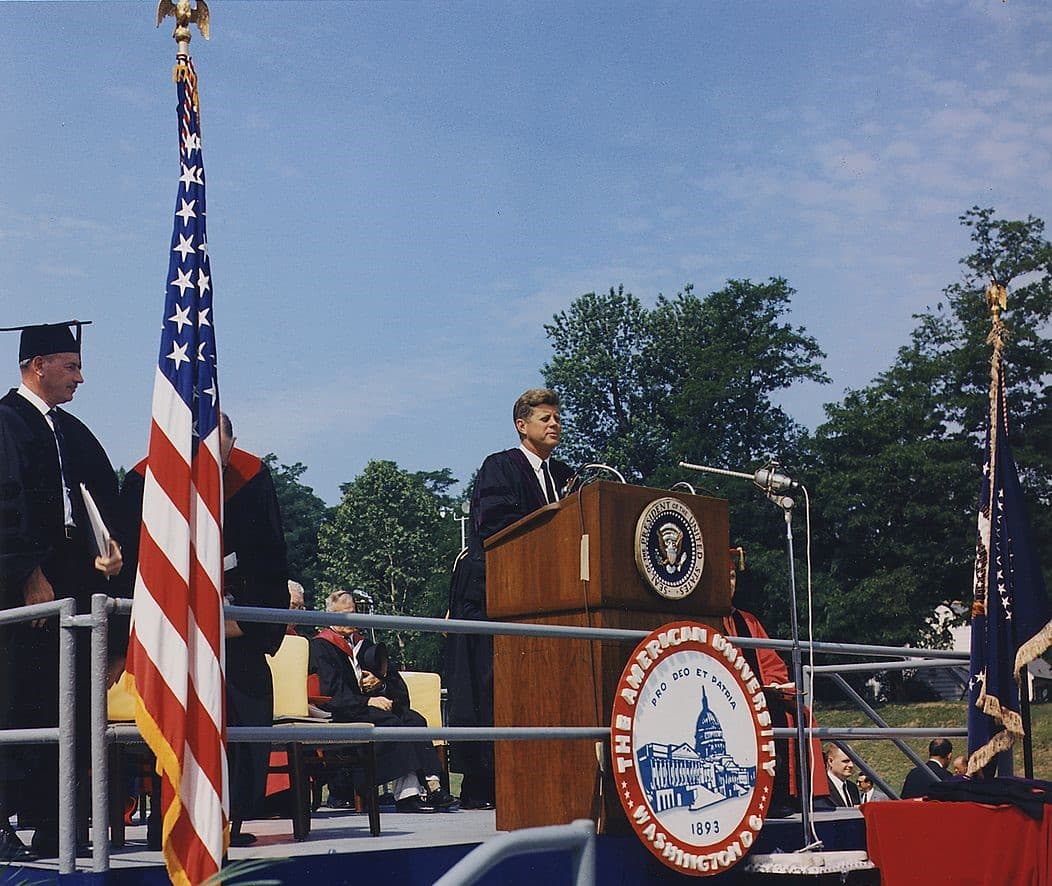June 10, is the anniversary of President John F. Kennedy’s declaration of war against the national-security branch of the U.S. government. To be sure, he didn’t call it that. He simply was delivering a speech at the June 10, 1963, commencement exercises at American University. The speech has gone down in history simply as JFK’s “Peace Speech,” but in essence it was a declaration of war against the Pentagon, the CIA, and the NSA.
JFK delivered his speech at the height of the Cold War, the period of time in which the United States was supposedly gravely threatened by a worldwide communist conspiracy that was supposedly based in Moscow, Russia. The communists were coming to get us, U.S. officials said. There could never be either a negotiated peace or peaceful co-existence with the communist world, they claimed. This had to be a war to the finish.
The Cold War sometimes turned hot. There was the Korean War in the early 1950s, when the U.S. government intervened to protect the right of South Korea to secede from the rest of the nation rather than being forced to be part of a communist nation. By June 1963, thousands of U.S. military advisors were in Vietnam for the same reason.
The irony is that Russia’s communist regime had just recently been America’s ally and partner in World War II. The two nations had worked together to defeat Nazi Germany. But as soon as the war was over, U.S. officials told the American people that they could not rest because they now faced a new official enemy that was arguably more dangerous and threatening than Hitler and the Nazis. That new foe was Soviet Russia, communism, and the Reds.
In fact, that was the justification for converting America’s federal governmental structure from a limited-government republic to a national-security state, one in which a major part of the U.S. government acquired omnipotent, totalitarian-like powers, including the power of state-sponsored assassinations.
When JFK became president, he was pretty much a standard Cold Warrior, one who had bought the official line about how the United States was in grave danger of being taken over by the Reds. That was why he approved the CIA’s plan to use CIA-trained Cuban exiles to invade Cuba and oust the communist regime that had taken over the island. Like other Cold Warriors, Kennedy was convinced that a communist regime 90 miles away from American shores proved that the communist threat was getting ever closer to the United States.
After the U.S. failure at the Bay of Pigs, Kennedy realized that he had been hoodwinked by the CIA, which had assured Kennedy that the invasion could succeed without U.S. support. It was a lie. The CIA figured that Kennedy would have no choice but to provide the support once the operation was in danger of going down to defeat. Kennedy was livid and vowed to dismantle the agency. By the same token, the CIA was equally livid, convinced that Kennedy was a coward, an incompetent, and a traitor.
After the Bay of Pigs disaster, tensions with the Pentagon began increasing. Convinced that a communist regime in Cuba posed a grave risk to the United States, the Pentagon began pressuring Kennedy to initiate a full-scale invasion of the island. At the same time, convinced that the Reds were expanding in Southeast Asia, the Pentagon pressured Kennedy into sending thousands of troops into Vietnam.
Kennedy’s settlement of the Cuban Missile Crisis brought the antipathy of the U.S. military establishment toward Kennedy to the surface, especially since the settlement assured the Russians that there would no longer be any more U.S. invasions of Cuba. That meant that Cuba would now permanently serve as a grave threat to U.S. “national security.” The Joint Chiefs of Staff considered the settlement to be among the worst defeats in U.S. history. They compared the settlement to Neville Chamberlain’s capitulation to Hitler at Nuremberg. Like the CIA, they were convinced that Kennedy’s cowardice, incompetence, and treason posed a grave threat to “national security.”
For his part, it was after the Cuban Missile Crisis, when the world came to the brink of nuclear war, that Kennedy achieved a monumental “breakthrough.” He came to the realization that the Cold War was nothing more than one great big racket. He decided to move America in a totally different direction than the one that the national-security branch was leading America. Kennedy’s vision consisted of ending the Cold War and establishing peaceful and friendly relations with Russia and the rest of the communist world. That vision, needless to say, was anathema to the U.S. national-security establishment.
JFK set forth his vision for America in his Peace Speech at American University. It was essentially a declaration of war against the national-security branch of the federal government and its vision entailing a permanent Cold War, periodic hot wars, and, of course, ever-increasing budgets for the military-industrial complex.
The war between the executive branch and the national-security branch of the federal government was on. Over the fierce objections of the national-security establishment, Kennedy entered into a Nuclear Test Ban Treaty with the Russians. He endorsed the idea of a joint trip to the moon, which, of course, would have meant sharing rocket technology with the Reds. He ordered a withdrawal of troops from Vietnam. On the day he was assassinated, he had a secret emissary having lunch with Fidel Castro.
But Kennedy would discover what Chile’s democratically elected president Salvador Allende would discover ten years later. In a war between the executive branch and the national-security branch of a government, the former is no match for the latter. Both Kennedy and Allende would discover that truth on two fateful days in the histories of their two nations: November 22, 1963, and September 11, 1973, when both presidents ended up dead.
Reprinted with permission from Future of Freedom Foundation.

